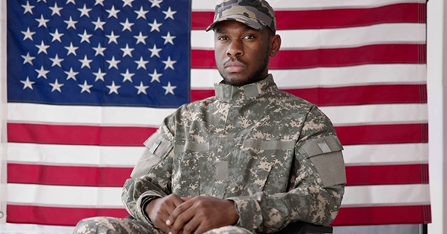Painful headaches caused by service-related disabilities can intrude on a veteran’s life and career.
Summary
- Service-related headaches can have a harsh impact on a veteran’s job, quality of life, and health, so it is in their best interest to rely on capable legal assistance to navigate the VA appeals process for a veteran headache claim.
- Veterans may experience headaches as a result of various service-related conditions, including traumatic brain injuries, cancer, tinnitus, and mental health disorders.
- Different types of headaches, such as migraines, tension headaches, and cluster headaches, may have distinct symptoms and causes, affecting veterans’ daily lives.
An occasional headache can be dismissed as a minor annoyance, but veterans who experience regular or intense headache episodes may suffer continued harm from secondary or service-connected headaches. Headaches can be associated with both mental and physical service-related conditions.
As veterans disability claims lawyers, we know that it can be difficult to get the VA to take headache disability claims seriously. However, we consistently rise to the challenge for our clients.
Give us a call at (855) 651-1522 or fill out our online form to schedule a free consultation with our team. We will take the time to answer your questions and take your concerns seriously.

Contact Us Today
We Will Fight For Your Benefits
We guarantee 100% privacy. Your information will not be shared.
Reasons to Let VetLaw Handle Your VA Disability Claim for Headaches
Our team of veterans disability claims denial attorneys has demonstrated the ability to overcome the odds for our clients during our decade of service. For VA-accredited attorneys like our founder, Brendan Garcia, this mission is personal. Like so many other veterans, he has experienced the obstacles of the VA appeals process first-hand.
At VetLaw, we want to help alleviate the pressure on you to maximize your VA disability benefits so you can afford healthcare, offset lost wages, and focus on living a fulfilling life despite your service-related headaches. Our team has the expertise and ability to successfully appeal your veteran headache claim, as our former clients will attest.
Our Reliable Case Results and Great Client Reviews Set Us Apart
We work tirelessly to earn our clients’ respect by offering unparalleled service and outstanding results. Our clients have said the following in reviews about their experience with VetLaw:
“I was extremely pleased with the speed and efficiency of the settlement provided by the VetLaw team.”
“I can’t say thank you enough. If you’re having a rough time with the VA, VetLaw can help and they’ll stand with you.”
If you are interested in pursuing an appeal with the VA regarding secondary or service-related headaches, you can afford to settle for an inexperienced or unmotivated team. With VetLaw, you’ll have seasoned and determined veterans disability appeals attorneys on your side.
Headaches Are a Symptom of Multiple Service-Related Injuries
Oftentimes, headaches are side effects of presumptive service-connected conditions. For example, a number of veterans who were deployed to Iraq and Afghanistan returned with persistent headaches, among other symptoms.
The official diagnosis for the collection of ailments is Medically Unexplained Chronic Multisymptom Illness (MUCMI). The VA has identified serving in these locations as a cause of MUCMI, making it easier for former service members to file veteran headache claims with the VA.
Other common service-related disabilities, often caused by exposure to toxins or some form of trauma, can also produce painful headaches. Headaches can be psychosomatic, such as migraines linked to mental health conditions. They can also develop as a result of a physical injury, like a brain tumor exerting pressure on surrounding tissue.
Migraines and headaches may be a symptom of or secondary to service-related conditions like:
- Brain cancer
- Traumatic brain injuries
- Tinnitus
- Sleep disorders
- Mental health conditions, including anxiety, depression, and PTSD

Types of Headaches That Veterans May Experience
How a veteran’s headache presents may offer valuable insight. By classifying headaches, we can better understand what symptoms will likely accompany them and what the primary cause is.
Migraines: A condition in which severe pain in the head is coupled with other cognitive and physical symptoms during the episode. Veterans who suffer from migraines may display a strong aversion to bright lights.
Additionally, they may experience mood changes, exhaustion, and other symptoms like vomiting. Migraines can be brought on by specific sensory triggers or stress, but they can also manifest seemingly at random. Early symptoms can alert a vet that a migraine attack is imminent.
Tension Headaches: This type of headache is a perfect example of how mental and physical health are connected. Usually caused by mental stress or muscle strain, a tension headache is less intense than the average migraine. Pain is dispersed across the head, and it comes on gradually.
Cluster Headaches: A set of serious headaches that takes place over a period of weeks or months. Pain is typically localized and it may be concentrated behind one eye. Other physical symptoms of a cluster headache may include a runny nose, inflamed eye, and swollen forehead.
How Chronic Headaches Affect Veterans’ Lives
The consequences of headaches are not limited to a veteran’s physical health. Unfortunately, the ramifications of frequent headaches can impact numerous aspects of a veteran’s life. You may find that your service-related headaches:
- Prevent you from focusing at work. You may be unable to operate heavy machinery, recall pertinent details, or concentrate on critical conversations. This can limit your ability to advance in your career. In the worst-case scenario, frequent headaches can prevent a veteran from doing their job safely.
- Make it harder to socialize. Recurring headaches caused by a service-related injury may force you to cancel plans with friends, miss out on traveling to family events, and more so that you can endure a cluster headache or recuperate from a migraine in a dark room.
- Limit your ability to enjoy your life. Chronic pain often impairs veterans from fully participating in their hobbies or engaging with the people they care about. For instance, severe headaches may keep you from enjoying things like reading, playing catch with your kids outside, or attending concerts.
VA Disability Benefits for Veterans With Headaches and Migraines
For a veteran headache claim, a vet’s symptoms must correspond with the VA’s description of 10% disability for headaches in order to be entitled to any benefits. Veterans seeking VA disability benefits for their headaches can secure a maximum VA disability rating of 50% based on the current rating schedule.
However, that does not mean that you should forgo pursuing a veteran headache claim. Remember, your combined VA disability rating determines the level and type of benefits you are eligible for. In addition to a monthly, tax-free benefit, a higher level disability rating may render you eligible for other VA disability benefits like:
- Aid and Assistance
- Total Disability for Individual Unemployability
- Other Special Monthly Compensation
Why You Need the Dedicated Team at VetLaw to Help You With Your Veteran Headache Claim
Understanding how the VA appeals system works takes time and a concentrated effort. VetLaw has put in the work over the last ten years to become the leading provider of legal support for veterans seeking to appeal a VA decision regarding their disability benefits.
Our VA-accredited attorneys are respected because we are not afraid to stand up for our clients and their needs. We have significant resources that allow us to support clients during a lengthy appeals process. Therefore, you can rest assured that we will be with you for every step until you receive the VA disability benefits you deserve.

Speak to Our VA Disability Benefits Lawyers About an Appeal for Your Veteran Headache Claim
Coping with headaches connected to a service-related injury can be unpleasant, hold you back from succeeding at work, and interfere with your relationships. There is no need to tackle a VA disability appeal alone- let VetLaw take the lead. We specialize in helping veterans secure disability benefits after the VA has denied their claim.
You can reach us at (855) 651-1522 or fill out our online form to schedule a free consultation with our team. Our veterans disability appeals lawyers understand that details matter, and we will carefully build a strong appeal to give you the best chance of success.
Frequently Asked Questions
Regarding VA disability benefits, a Secondary Condition is a medical issue that was caused or aggravated by a service-related condition. For example, say a veteran suffered from pre-existing migraines.
While serving in the Navy, they sustained a TBI that made their migraines more frequent to the point that they had to miss work once a month. The migraines could be considered a Secondary Condition in this case.
Migraines are typically considered to be a type of headache, with the term headache referring to a broader range of conditions. Migraines also have specific symptoms that differentiate them from other types of headaches, and they are often more debilitating.
If you have a medical diagnosis for migraines, your veterans disability benefits attorney will likely advise you to pursue a VA migraine disability claim as it more accurately reflects the severity of your symptoms.
This phrase refers to one of the metrics the VA uses to evaluate veteran migraine claims. If your headache is so severe that you need to lay in bed or recline in a chair, that describes the “necessity of prostration”.

